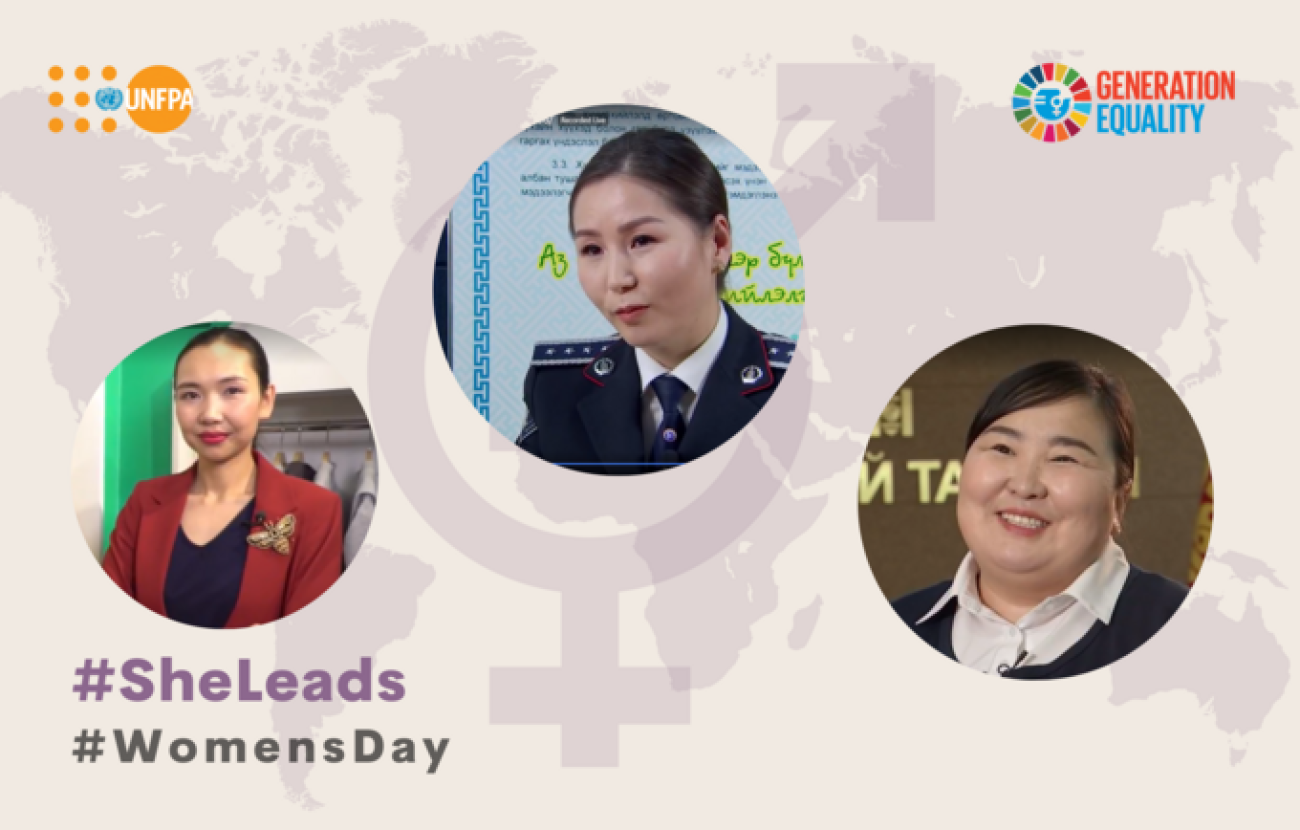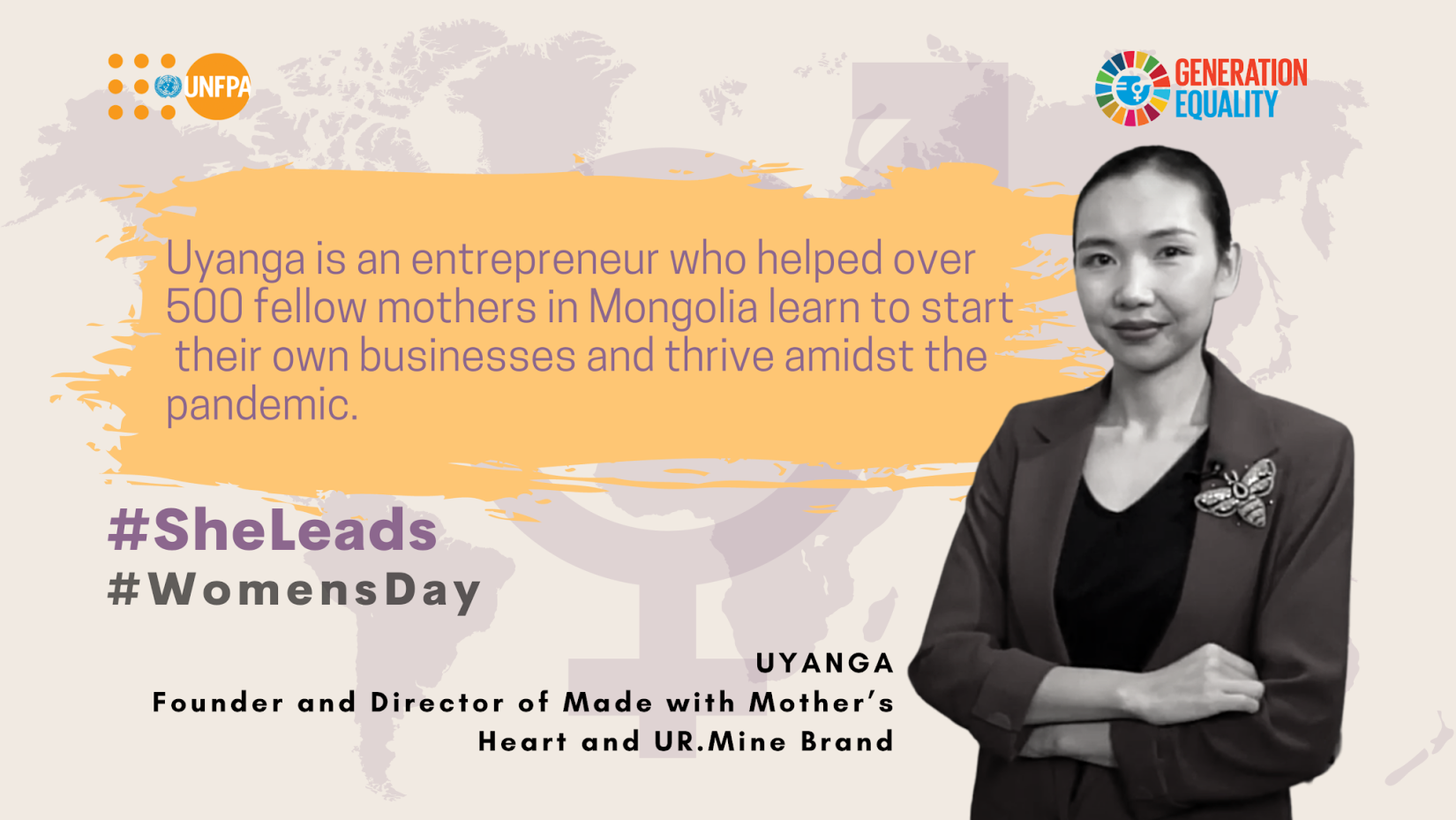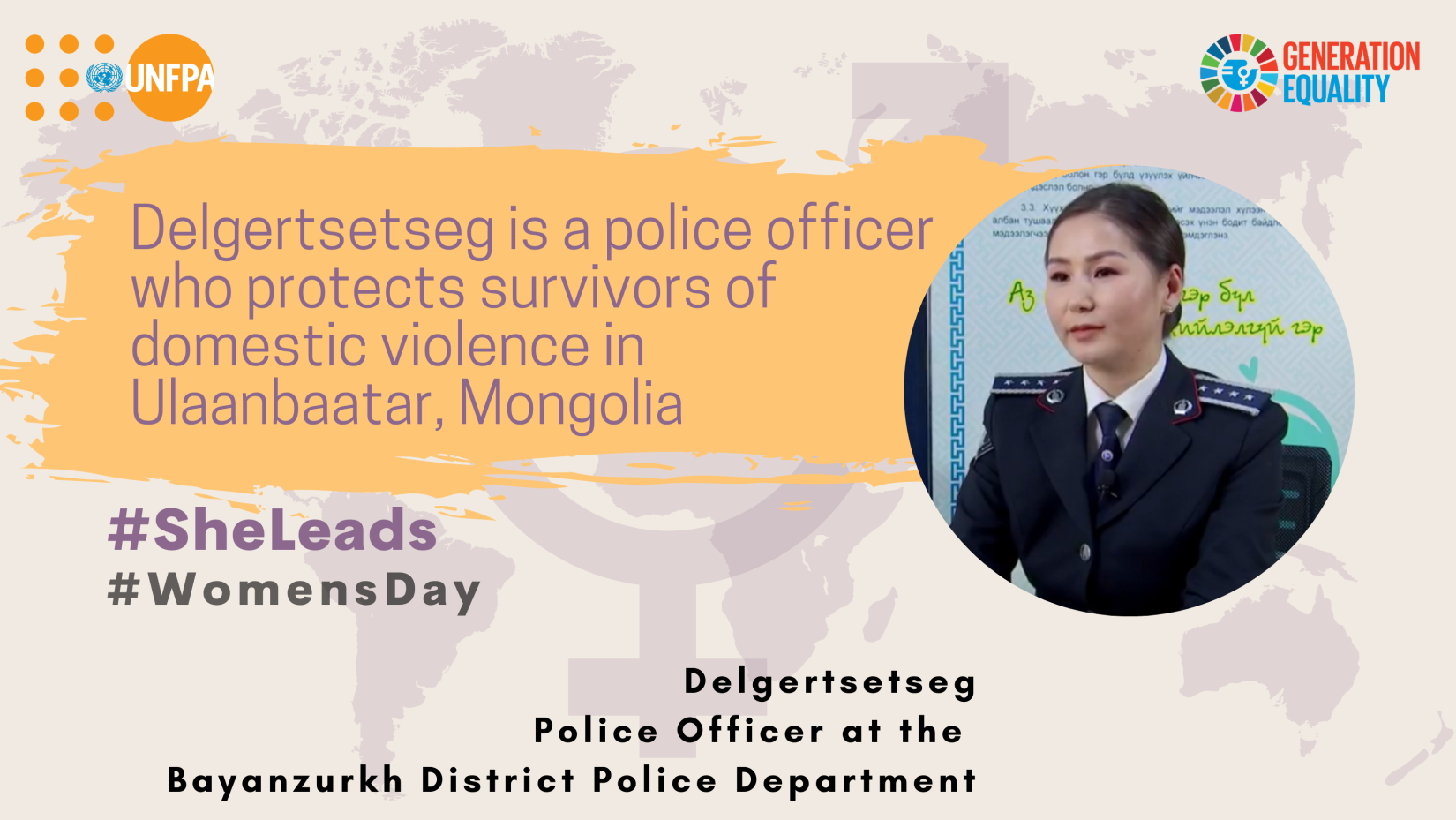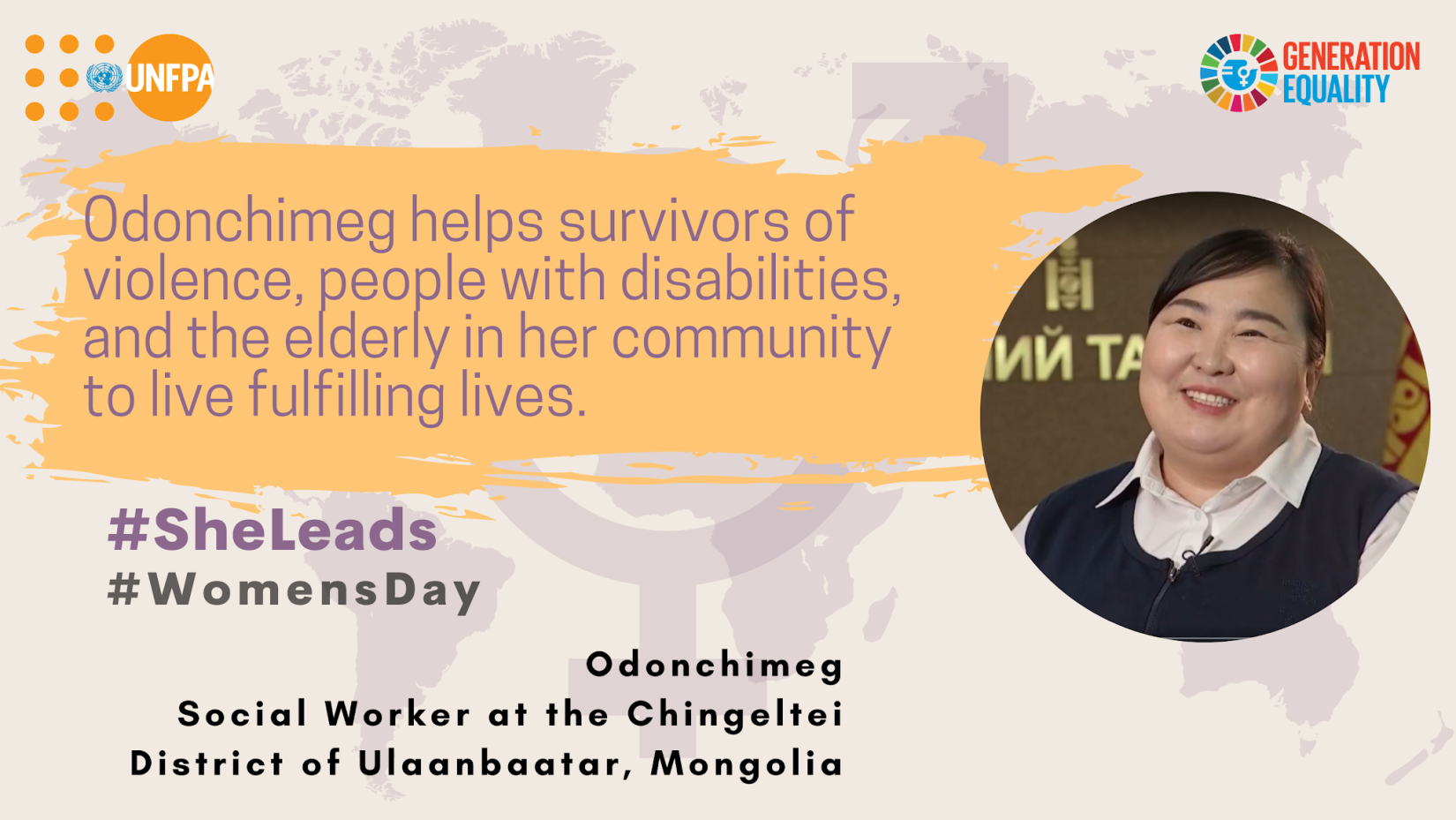Celebrating Women’s Leadership in Mongolia

In celebration of Women’s Month, UNFPA Mongolia sheds light on stories of excellence, resilience and leadership of everyday women in Mongolia.
Uyanga is an entrepreneur and a mother to three young children. She is the force behind 'Made with Mother’s Heart', the company behind the “UR.mine” brand. The brand, which is a play on words that could be interpreted as “my child” in Mongolian or “you are mine” in English, produces empowering statement clothes for children.

Uyanga started her venture in 2017 with as little as MNT 500,000 (USD 175) in capital and an infant to care for. She admits that being a mompreneur has been no easy feat, especially as her three kids are all younger than 4 years. Juggling breastfeeding and working full-time was particularly difficult, and she would even have to bring her babies on trips to local and international markets to buy raw materials. Uyanga reflects that motherhood slows down her career growth, but she prefers to think of her children as her inspiration to succeed.
“Caring for my children is not a reason to set aside my business or to give up on my dreams,” Uyanga said.
“Rather, my children are the reason why I have been so motivated and energized to succeed. Children are indeed invaluable teachers. They teach us patience. They help us to be more attentive to the needs of others, and to better communicate with those around us. The way I see it, this is what makes women even more powerful, even in running a business.”
Now, almost four years and two more children later, her business is thriving despite the challenges posed by the pandemic, and she even has plans for expansion in 2021. This is in part due to the fact that Made with Mother’s Heart was quickly able to adapt during the pandemic. With the demand for her primary products declining during the lockdown, Uyanga turned her eyes instead to produce what was needed instead – face masks. She also adjusted her production plans; she continued producing clothes for infants as babies are still being born every day, but she decided to stop producing clothes for young children as they have been staying at home due to kindergarten and school closures.
Beyond pursuing profit to help support her family, Uyanga also makes sure to give back, especially by helping uplift mothers and grandmothers in her community. Made with Mother’s Heart employs grandmothers in their production like. These grandmothers are able to craft products like leather and felt baby shoes in their own homes, which gives them the opportunity to earn for themselves while taking care of their grandchildren. During the lockdown, Uyanga also collaborated with the Goolingo Business Group to organize a training for over 500 fellow mothers on how to start their own small businesses. As a result, 5 participants so far have launched their own businesses using what they have learned from the training.
When asked about her plans for the future, Uyanga shared that she hopes to not only expand her company at a national scale, but she is also working on exporting a proudly Mongolian brand produced with materials that are 100% locally sourced.
Watch Uyanga's full intervew at MNB Family

Delgertsetseg has always dreamed of becoming a police officer. Her father worked in the police force for 32 years up until his retirement, and ever since she was a child, she knew she wanted to follow in the footsteps of her personal hero. She finally achieved her dreams in the autumn of 2008. She graduated from Ikh Zasag University’s Law School, and she took a short course at the Police Academy, which led to her landing a job at the Bayanzurkh District Police Department, despite some early setbacks that came with raising children that were still too young.
Today, Delgertsetseg is a police lieutenant in charge of domestic violence cases in the 2nd Division of the Bayanzurkh District Police Department, where her husband also works as an investigator. She shared that one of the things that worries her these days is the domestic violence situation in the country. She believes that husbands and wives need to communicate better to better understand each other and avoid conflicts that could escalate into violence. She also noticed how alcoholism has been a major trigger to the high rate of domestic violence. For example, in one night, an average of 10 perpetrators of domestic violence who commit their offences while drunk is held at the detention center.
When Mongolia recorded its first cases of community transmission in November 2020, the government imposed a strict lockdown that was enforced by mobilizing the entire police force and other civil servants. Delgertsetseg was put in charge of 67 civil servants on continuous patrol, and many of these civil servants remarked how they could not believe how hard police work was, even though many of them were glad to help out during this difficult time. All these responsibilities come on top of her regular duty to work on domestic violence cases, which has spiked throughout the pandemic.
Delgertsetseg has made sacrifices for her job, including losing precious quality time with her family and risking her own health to keep the country safe during the pandemic. With both her and her husband working especially hard during this time, often from early in the morning until late in the evening, they also had to rely on the help of their eldest daughter who kept the house in order and looked after their younger child. However, the couple truly believes that their family can overcome any difficulties if their relationship is kept grounded on mutual understanding and respect. Even with their busy schedules, the couple would always do their best not to miss special occasions, or at the very least, they would go out of their way to show their affection. Delgertsetseg believes that it is this philosophy and commitment shared between her and her husband that cultivates a warm and supportive environment for their family, and she also believes that such efforts could generally reduce domestic violence in the country.
Still, Delgertsetseg has been told many times by her loved ones to shift careers and find something easier to do. But she is not willing to give up on her lifelong dream; she loves her job, and she values her ability to keep survivors of domestic violence safe from further harm.
Watch Delgertsetseg's full intervew at MNB Family

When Odonchimeg started her journey to become a social worker, she admittedly did not really know what that meant. All she knew was that social workers help people, and that is something she wants to do. Today, Odonchimeg has been serving as a social worker at the Chingeltei District of Ulaanbaatar for the last 14 years, and every day, she works tirelessly to help the many vulnerable people living in very difficult conditions in her community, including the elderly living alone, people with disabilities, and survivors of gender-based violence (GBV).
Odonchimeg often spends long hours roaming her community and visiting the homes of people that she knows are struggling to evaluate their conditions and to refer them to agencies that provide the help that they need. She shares that one of the people she looks out for is a man struggling with a mental disorder. Every time she passes by his house, she makes sure to check for smoke coming from his chimney or a light seen through his window. She is always happy to see these small signs because they let her know that he is fine. On days when the chimney is still or the window is dark, she worries and stops by his home to see if he is doing well.
Odonchimeg also pays special attention to the issue of domestic violence in her community, tackling it from both the side of the survivor and the perpetrator. She acknowledges that over the years, people have become more aware and less tolerant of domestic violence, which has led to an improvement of GBV detection and an increase in the number of survivors to seek help. However, there is still a knowledge gap among the public regarding the relevant laws that protect their right to live free of violence, and she knows that social workers and other officials like her at the grassroots level need to act quickly to prevent and respond to GBV. This was especially critical during the COVID-19 lockdowns, as they observed a clear increase in the number of domestic violence-related calls and reports. Aside from providing social services to survivors seeking help, Odonchimeg has also been proactive in working with perpetrators of violence. She has initiated trainings and organized support groups to help alcoholics who perpetrate domestic violence to reform their attitudes and behaviors. She admits that it has been a daunting task, but she has already seen some positive results.
A fierce passion to help others has always fueled Odonchimeg’s work, but this same vigor sometimes led to difficulties in her personal life. Particularly during her first few years as a social worker, she struggled with handling difficult cases because her empathic nature led to her internalizing the hardships of her clients. She could not stop thinking about their problems and she would spend many sleepless nights in turmoil over their situations. These days, Odonchimeg has gotten better at balancing staying compassionate in dealing with her clients but still placing some emotional distance between her and her cases to protect her own mental health. However, she continues to work tirelessly, sometimes working overnight or throughout weekends. As a result, she has not been able to spend enough quality time with her children, but she always tries to make up for it by spending as much as her free time with them as possible.
Even with all these challenges, Odonchimeg feels that it is an honor for her to be a social worker and to help people change their lives for the better.
Wath Odonchimeg's full intervewT at MNB Family
--------
In celebration of Women’s Month, UNFPA Mongolia in collaboration with the Ministry of Labour and Social Protection and the MNB Family Network is shining the light on stories of excellence, resilience and leadership of everyday women in Mongolia during the COVID-19 pandemic. The stories were first published on the UNFPA Mongolia's website
--------





